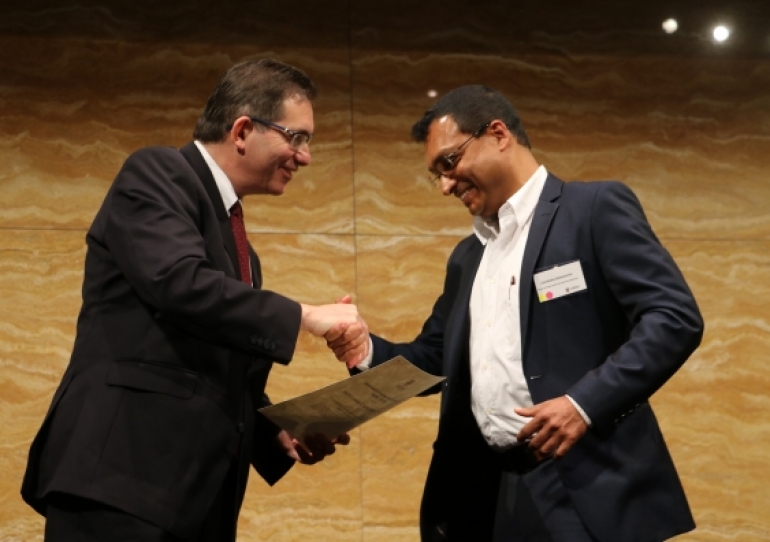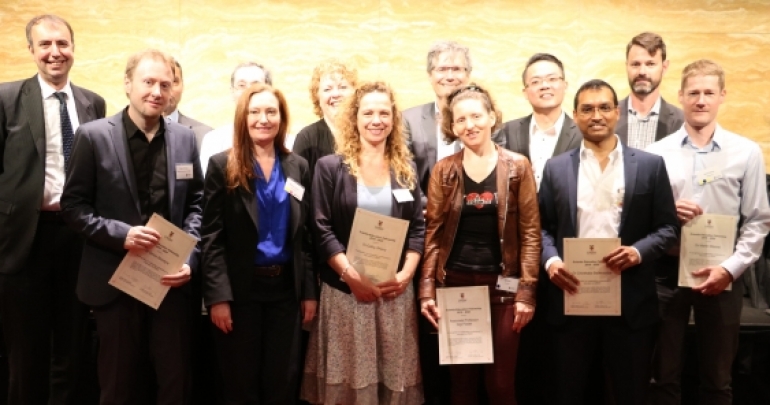Fifteen UNSW academics will provide leadership in learning and teaching after being named as inaugural Scientia Education Fellows.
Fifteen academics have been named as inaugural Scientia Education Fellows and will provide leadership in learning and teaching to support UNSW’s commitment to be a teaching as well as a research intensive university.
The 2016 Fellows were announced by UNSW President and Vice-Chancellor Professor Ian Jacobs at this week’s Learning and Teaching Forum “Towards 2025: Inspiring Learning”, which provided an opportunity to focus on how the 2025 Strategy will reshape learning and teaching at UNSW over the next decade.
The 2016 Scientia Education Fellows are: Dr Chinthaka Balasooriya, Medicine; Dr Martin Bliemel, Business; Associate Professor Richard Buckland, Engineering; Associate Professor Gigi Foster, Business; Professor Sami Kara, Engineering; Dr Michelle Langford, Arts and Social Science; Dr Benson Lim, Built Environment; Associate Professor Louise Lutze-Mann, Science; Dr Simon McIntyre, Art and Design; Associate Professor Emma Robertson, Art and Design; Dr Cathy Sherry, Law; Professor Alex Steel, Law; Professor Chihiro Thomson, Arts and Social Science; Associate Professor Chris Tisdell, Science; and Professor Gary Velan, Medicine.
Our Education Fellows will inspire staff and students through their demonstrated commitment to educational excellence and enhancing the student experience.
The Scientia Education Academy was established to recognise outstanding educators, harness the drive, enthusiasm and expertise of Fellows to enhance teaching across UNSW, build communities for learning and teaching improvement, provide feedback mechanisms for academics; inspire academics to rethink their teaching; and provide examples of being digital in teaching.
The 2016 Fellows will help position UNSW as a leader for student experience and outcomes by enhancing the profile and quality of learning and teaching, including innovation in curriculum design and delivery and online education; interacting with UNSW’s wider academic body and contributing to education strategy and improvements in teaching practice; and contributing to scholarly outputs in learning and teaching.
Pro-Vice Chancellor (Education) Professor Geoff Crisp said: "Our Education Fellows will inspire staff and students through their demonstrated commitment to educational excellence and enhancing the student experience."
The importance of this commitment to educational excellence was underlined by two students who spoke at the forum's opening. "Participants at the forum were impressed by the presentations from two of our UNSW students, Sophie Johnstone, President of the Student Representative Council, and Trudy Hasna Taftiana, an international student completing a Masters in Engineering Science. Both students spoke of their personal journeys at UNSW and the importance of actively engaging students in both learning and the life of the university."
In his opening address, Professor Jacobs said that raising the profile, recognition and rewards for high-quality teaching and education to reflect its true importance to society was a key aspect of the 2025 Strategy.
“Educational excellence is essential, both to attracting the very best and brightest students and to producing the finest graduates and alumni. And between those two focal points – the start and completion of the education process – the reputation of UNSW rests fundamentally on the quality of its teaching,” he said.
Professor Jacobs noted that one of the biggest shifts involved digital learning and teaching. “It is unquestionably going to be a major change in university education and we don’t quite know just where it will take us, or even how it will operate as it evolves. That’s both a challenge to those who teach, and a great opportunity,” he said.
Some of those challenges and opportunities were on show during the forum when two dozen UNSW academics shared how they inspire learning through assessment and feedback strategies, grand challenges and partnerships, teaching excellence, work integration, curriculum and program design, digital innovation, and equity, diversity and inclusion.
The forum also included a showcase of posters from staff, demonstrating how individuals and groups at UNSW have employed a diverse range of techniques to enhance learning and teaching practice.
The event was also an opportunity to acknowledge four successful applications for the 2016 Citations for Outstanding Contributions to Student Learning, awarded by the Federal Government. The recipients are: Dr Rebecca LeBard (Science); Dr Leila Morsy (Arts & Social Science); LionsHeart Studios, Dr Alberto Motta and Dr Isabella Dobrescu (Business); and Dr Nalini Pather (Medicine).
***
This article was originally published in UNSW Newsroom (3 November 2016)

